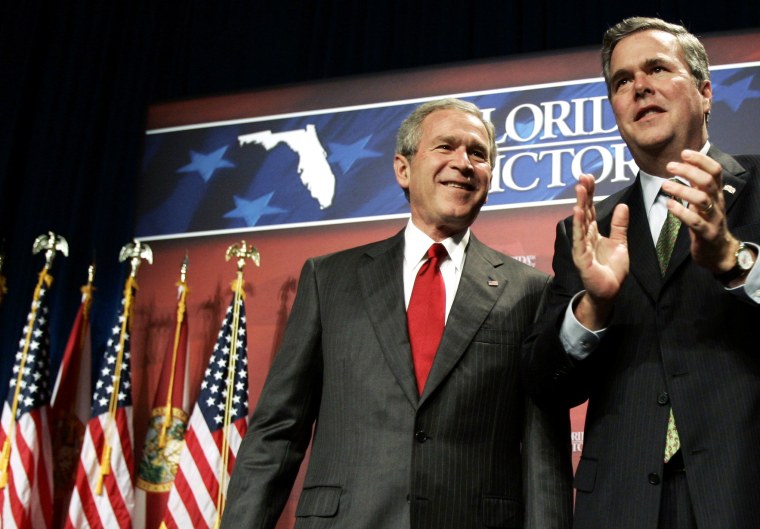For Jeb Bush, his family legacy comes with certain advantages and disadvantages. The Florida Republican, for example, was able to parlay his last name into becoming a governor. He's also been able to take full advantage of family connections to advance his ambitions, and he's currently able to raise all kinds of money from some of the same donors who contributed to his brother and father.
But there's also a catch. Jeb Bush is the grandson of a senator, and the son and brother of presidents, and that leaves him with an awkward inheritance: he's been able to use the family name to boost his career, but that arguably means some ownership of the unflattering family legacy.
Jeb Bush doesn't want to talk about the wars in Iraq and Afghanistan started by his brother, former President George W. Bush. Asked at an event Friday about a foreign policy speech he's planning to give next week, the former Florida governor replied, according to Bloomberg News: "I won't talk about the past."
The former governor added, "I'll talk about the future. If I'm in the process of considering the possibility of running, it's not about re-litigating anything in the past."
Obviously, this is more than unsatisfying. It's also unacceptable.
I'm not blind to the circumstances. Fourteen years ago, during a presidential debate, Jim Lehrer asked then-Gov. George W. Bush about the wisdom of U.S. missions in Grenada and Panama. The Republican nominee said with a smirk, "Some of them I've got a conflict of interest on, if you know what I mean."
In 2000, some saw this as charming. In 2015, the problem is far more acute. Jeb Bush's brother launched two costly, deadly wars, and managed to screw up both, badly. The consequences of those failures are not some distant memory; they are part of an ongoing mess Bush's successor has spent six years trying to clean up.
If Jeb Bush expects to be president, he can't simply take a pass on these questions because his brother's foreign policy produced catastrophic results.
Indeed, the "I won't talk about the past" line isn't even true, strictly speaking. Jeb Bush is eager to condemn President Obama's efforts in foreign policy, all of which happened in the recent past. How exactly does the Florida Republican intend to draw a distinction between the current president's handling of foreign crises and the conditions that created the crises in the first place?
For that matter, if Jeb intends to declare wars off-limits to scrutiny because his brother launched them, just how far does he think this "I won't talk about the past" maxim can go? Does he intend to ignore questions about the Bush legacy on the economy, too? How about his brother's fiscal record?
My point is not that Jeb Bush is responsible for George W. Bush's failed presidency. That obviously wouldn't be fair. But there are two simple truths that he cannot easily avoid: (1) if Jeb wants to take advantage of the benefits of being a Bush, he'll have to accept the downsides, too; and (2) if Jeb wants to be president, he can't seriously expect to dodge a discussion about the lasting consequences of his brother's disastrous White House tenure.
